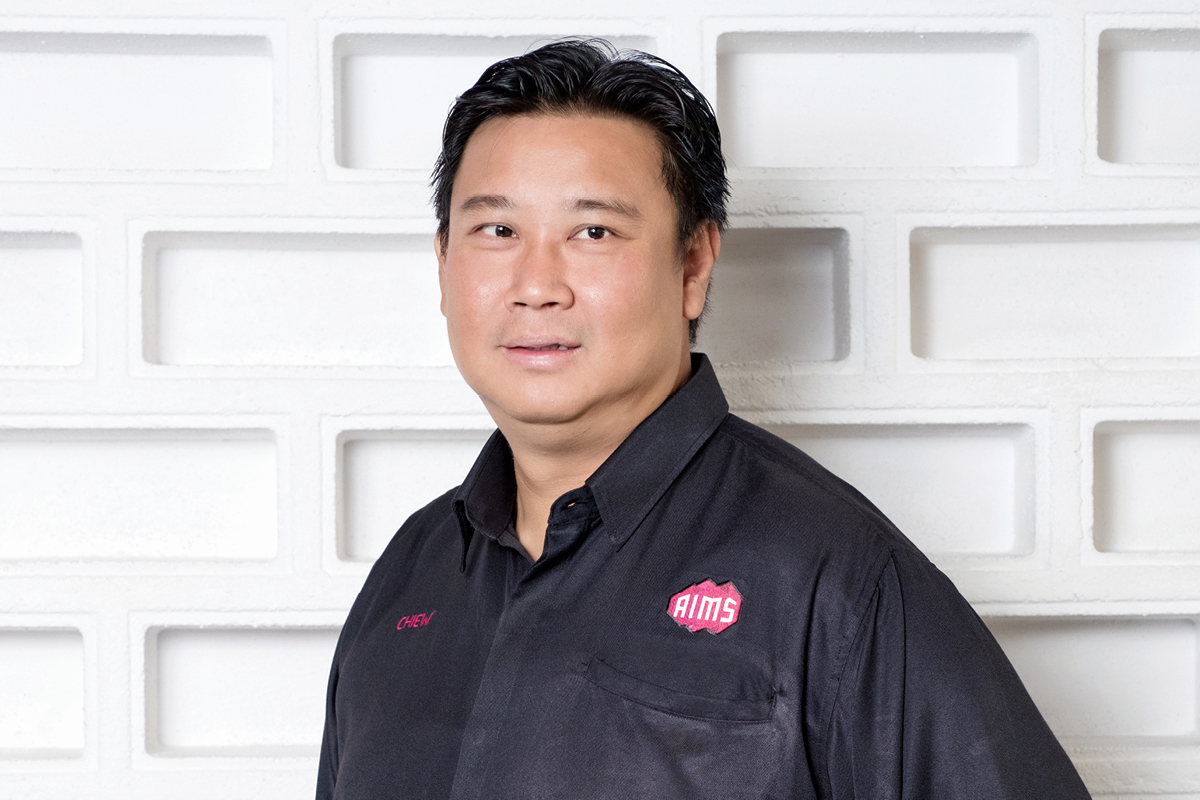AIMS Group is a leader in the data-centre services industry, providing secure, robust and connectivity-rich data-storage facilities in strategic sites across Malaysia and South East Asia. With the support of its parent company, TIME dotCom, the Group’s portfolio has grown to include co-location services, managed services, network services, disaster recovery, cloud, and content delivery networks.
Its ongoing growth is testament to its competitive strength in a heated market, having seen a 24% jump in revenue last year, as well as a 14% increase in new customers, while its cloud-based services revenue grew by more than 300%.
Joining the IT industry on a whim before the dotcom boom, Chiew Kok Hin’s first experience with AIMS was as a customer-service representative in 1997. He spent the following 13 years working across each and every part of the business, losing track of the number of titles he’s had, before finally being appointed CEO in January 2010.
Since that time, he has spearheaded the growth of AIMS across new regions and capabilities, and even found time in his busy schedule to share with The CEO Magazine how AIMS has grown to become a multiple award-winning market leader.
The CEO Magazine: Over the past two decades, technology – and
the end users that rely on it – has evolved drastically. How has the business managed to keep pace?
Kok Hin: We keep pace with an evolving industry by defining ourselves correctly in the ecosystem game, investing in green technology and efficient operating systems, as well as adhering to strict industry standards. We always strive to provide customers with the latest hardware and technology solutions, creating a comprehensive, scalable and future-ready ecosystem.
As the most interconnected data centre in Malaysia, and anchor site for the Malaysian Internet Exchange (MyIX), we now host 100% of domestic telecommunication carriers and more than 80% of foreign carriers.
In 2016, we became the first data centre in Asia–Pacific to partner with Network Infrastructure Inventory Inc [Ni2] to provide an all-in-one platform for IT service management [ITSM], operational support systems [OSS], and data-centre infrastructure management [DCIM] capabilities.
This key achievement is especially noteworthy to our clientele in the financial, OTT, oil and gas, and telco sectors, which seek to outsource their IT infrastructure facilities to professional providers like ourselves to achieve better operational efficiency as well as enhanced customer experiences.

In terms of size, we have expanded our headquarters, Menara AIMS in Kuala Lumpur, by an additional three floors, resulting in a net lettable area of 15,000 square feet – taking the total size to 60,000 square feet – with added capacity to serve clients within the city.
AIMS was also recognised in 2016 with ISO/IEC 20000-1:2011 certification for its IT service management system, as well as becoming Payment Card Industry Data Security Standard (PCI DSS 3.2) certified.
What role does the prevalence of Big Data and the Internet of Things [IoT] play in driving the importance of your services?
The growth of Big Data and IoT is very complementary to our services, as both require enhanced levels of data storage, connectivity and managed services to support the growing requirements. AIMS is always on trend with the market and technology industry requirements: we are both a data centre and cloud service provider.
We are also a growing cloud business, with those new capabilities contributing to the data-centre revenue too. With our unceasing focus to deliver added value and quality to customers, we have outpaced the industry with a 24% growth rate. This was helped by several key OTT players, as well as notable insurance and retail projects over the course of last year.
AIMS specialises in carrier-neutral data centres for businesses. How is this a beneficial set-up for all stakeholders?
Carrier-neutral data centres allow the interconnection between many co-location and connection providers. It does not tie the end user to any one service provider, whether that be a telco, an ISP, or other. This provides greater diversity and flexibility for clients
seeking our services, enabling us to form a healthy client ecosystem.
Being able to connect with multiple carriers in a data centre also enables redundancy, optimal uptime, and cost-efficiency. Carrier-neutral facilities tend to be in areas with increased competition and more connectivity, which lowers prices and provides better service to end users.
Because the data centre isn’t limited to one service provider, all providers in the area are naturally encouraged to offer cost-efficiency and value, ultimately producing a better product for end users.
Looking five years into the future, what strategic goals do you have for improving or growing the business further?
In the immediate future, as more and more applications and online services emerge, we believe 2017 will be another great year for us. We’ll continue to provide the customisations that our customers need to set them apart.
Looking further ahead, AIMS’s target is to be the top regional data centre and managed service provider. Leveraging on TIME’s parent network, AIMS will be first targeting and growing the South East Asia region by prioritising the Thailand and Vietnam markets.
AIMS is also open for inorganic growth by acquiring suitable and synergised companies. Internal non-core business functions will be centralised with TIME for cost and business efficiency so that AIMS can focus solely in growing the data-centre business. As technology is evolving rapidly, there is a possibility that AIMS will also be offering new services, but it’s hard to pre-empt for this time frame due to the nature of the industry.
A Frost & Sullivan favourite
AIMS was announced as the 2017 Frost & Sullivan ‘Malaysia Data Centre Services Provider of the Year’ on 13 April this year. It is the fourth time the company has been awarded the accolade, and the second consecutive year in a row (2006, 2014, 2016, 2017). The annual awards are held to provide recognition to organisations that have surpassed market expectations by exhibiting outstanding performance in their respective industries in
the country.



